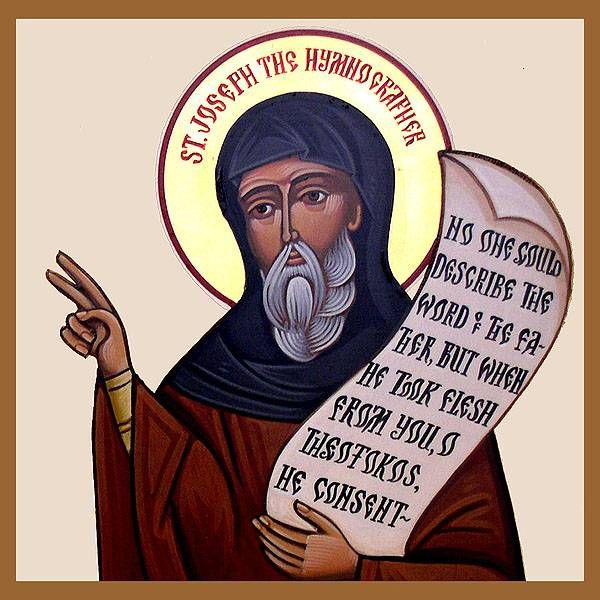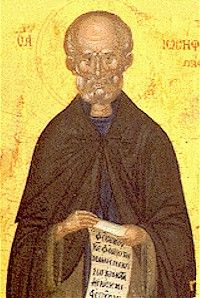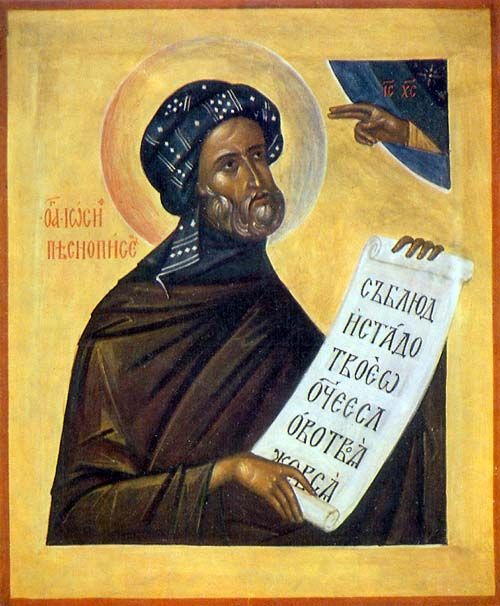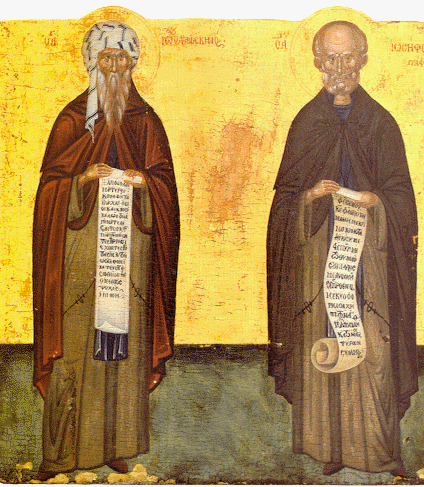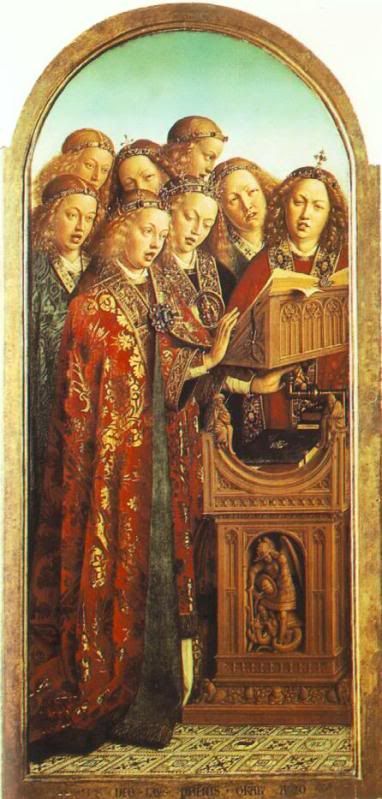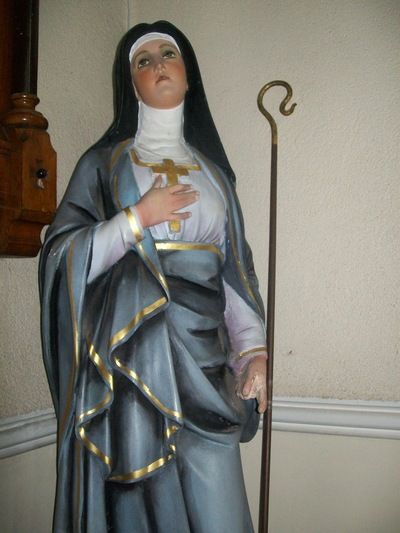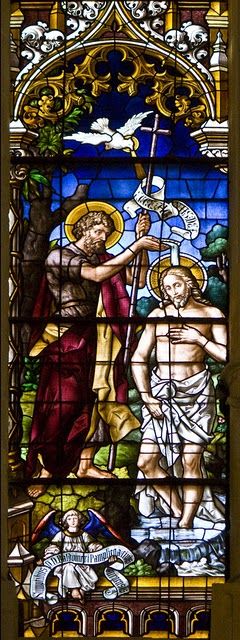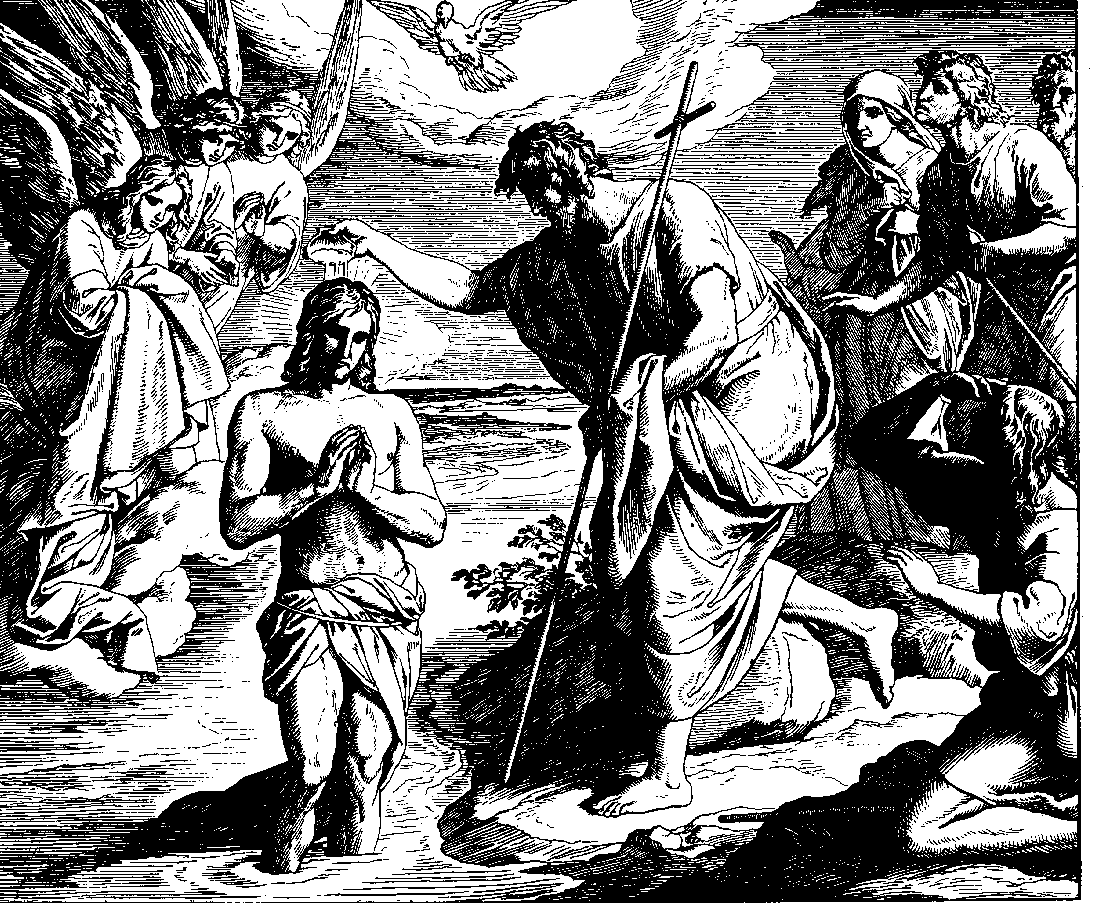Today, June 14, we celebrate the feast day of Saint Joseph the Hymnographer (810-886), tireless servant of the Lord, glorifying Him in life, in works, and through writing countless hymns and canons to the saints. Despite a lifetime of struggle, suffering, and imprisonment, Saint Joseph produced a catalog of writings which remain today, as well as over 200 hymns, many of which are still sung by modern congregations. He has been called "the sweet-voiced nightingale of the Church." Through his legacy of writings and song, Saint Joseph preserved a priceless record of the history of our faith—a faith which continues, unchanged and unabated, today.
Below, two additional hymns, originally penned by Saint Joseph (and later adapted for modern usage in the Church):
And Wilt Thou Pardon, Lord
And wilt Thou pardon, Lord,
A sinner such as I,
Although Thy book his crimes record,
Of such a crimson dye?
So deep are they engraved,
So terrible their fear,
The righteous scarcely shall be saved,
And where shall I appear?
O Thou Physician blest,
Make clean my guilty soul
And me, by many a sin oppressed,
Restore and keep me whole.
I know not how to praise
Thy mercy and Thy love;
But deign my soul from earth to raise
And learn from Thee above.
O Happy Band of Pilgrims
O happy band of pilgrims,
If onward you will tread,
With Jesus as your Fellow,
To Jesus as your Head.
O happy if you labor,
As Jesus did for men;
O happy if you hunger
As Jesus hungered then.
The cross that Jesus carried
He carried as your due;
The crown that Jesus weareth
He weareth it for you.
The faith by which you see Him,
The hope in which you yearn,
The love that through all troubles
To Him alone will turn.
What are they but forerunners
To lead you to His sight?
What are they save the effluence
Of uncreated Light?
The trials that beset you,
The sorrows you endure,
The manifold temptations
That death alone can cure.
What are they but His jewels
Of right celestial worth?
What are they but the ladder
Set up to heaven on earth?
O happy band of pilgrims,
Look upward to the skies,
Where such a light affliction
Shall win you such a prize.
To Father, Son, and Spirit,
The God Whom we adore,
Be loftiest praises given,
Now and for evermore.
Why pray the Rosary every day for a year?
Each time the Blessed Virgin has appeared-- whether it be to Saint Bernadette Soubirous at Lourdes; to Lucia, Jacinta, and Francisco at Fatima; or to Mariette Beco at Banneux-- she has asserted the importance, saving grace, and power of praying the Holy Rosary on a daily basis. Based upon her words, the Rosary is penance and conversion for sinners, a pathway to peace, an end to war, and a powerful act of faith in Jesus Christ. Pope Paul VI presented the Rosary as a powerful means to reach Christ "not merely with Mary but indeed, insofar as this is possible to us, in the same way as Mary, who is certainly the one who thought about Him more than anyone else has ever done."
To show us how this is done, perhaps no one has been more eloquent than the great Cardinal Newman, who wrote: "The great power of the Rosary consists in the fact that it translates the Creed into Prayer. Of course, the Creed is already in a certain sense a prayer and a great act of homage towards God, but the Rosary brings us to meditate again on the great truth of His life and death, and brings this truth close to our hearts. Even Christians, although they know God, usually fear rather than love Him. The strength of the Rosary lies in the particular manner in which it considers these mysteries, since all our thinking about Christ is intertwined with the thought of His Mother, in the relations between Mother and Son; the Holy Family is presented to us, the home in which God lived His infinite love."
As Mary said at Fatima, "Jesus wants to use you to make Me known and loved. He wishes to establish the devotion to My Immaculate Heart throughout the world. I promise salvation to whoever embraces it; these souls will be dear to God, like flowers put by Me to adorn his throne."

Today, June 14, we celebrate the feast day of Saint Joseph the Hymnographer (810-886), tireless servant of the Lord, glorifying Him in life, in works, and through writing countless hymns and canons to the saints. Despite a lifetime of struggle, suffering, and imprisonment, Saint Joseph produced a catalog of writings which remain today, as well as over 200 hymns, many of which are still sung by modern congregations. He has been called "the sweet-voiced nightingale of the Church." Through his legacy of writings and song, Saint Joseph preserved a priceless record of the history of our faith—a faith which continues, unchanged and unabated, today.
Joseph was born into a pious Christian family in Sicily. His parents, Plotinus and Agatha, in response to an invasion of Arabs, moved the family to Greece. There, at the young age of 15, Joseph entered the monastery at Thessolonica, and earned the love and respect of his community through industriousness, obedience, piety, humility, and scholastic aptitude.
During a routine visit to the monastery, Saint Gregory (then deacon) took notice of the young brother, and asked him to accompany him to the church in Constantinople—then suffering under the iconoclast persecution (see also Saint Theodosia of Constantinople). There, they lived near the Church of the Holy Martyrs, defending religious icons, preaching the Word of God, and ministering to the suffering Christian population. When it was decided that an emissary should be sent to Rome to have audience with Pope Leo III and inform him of the persecution under the Byzantine Emperor, Joseph was selected due to his obedience, wisdom, and gift of oration. He set off for Rome at once.
But life was not to be easy for Saint Joseph. On the way to Rome, he was taken captive by Arab bandits, brought to the island of Crete, and turned over to the Iconoclasts who locked him away in a dungeon. Never giving up hope and faith in the Lord, Joseph ministered to his fellow prisoners, keeping their spirits high, praying with them, and inspiring many to die martyr’s deaths for the faith.
Saint Joseph spent six years in prison, until the death of the Byzantine Emperor and the end of the iconoclast persecution. Prior to his release, he received a heavenly vision from Saint Nicholas of Myra, who provided him with a scroll upon which read: “Hasten, O Bountiful One and as Thou art merciful, hasten to come to our aid, for as Thou wilst, Thou canst…” Saint Joseph, after receiving instruction from Saint Nicholas, sang the words aloud, causing his chains to fall to the ground and the prison gates to be opened. He returned to Constantinople where he established a church in patronage to Saint Nicholas, and later a monastery.
Saint Joseph received the gift of the relics of Saint Bartholomew, which he placed in the church. He felt compelled to sing a hymn of praise to the saint, but no such suitable hymn existed, and he didn’t feel qualified or capable to write a canon for one so deserving. Saint Joseph prayed for 40 days, trying to discern the proper course of action, upon when Saint Bartholomew appeared to him. He said, “May the Right Hand of Almighty God bless thee, may Heavenly Wisdom pour out upon thy tongue, may thy heart be a temple of the Holy Spirit, and may thy hymnody sweeten the universe.” Following the apparition, Joseph wrote the canon to Saint Bartholomew, and from then on began to compose liturgical hymns in honor of Jesus, the Heavenly Father, the Mother of God, and the Saints.
One of those hymns, Stars of the Morning, follows:
Stars of the morning, so gloriously bright,
Filled with celestial splendor and light,
These that, where night never followeth day,
Raise the “Thrice Holy” song ever and aye.
These are Thy ministers, these dost Thou own,
God of Sabaoth, the nearest Thy throne;
These are Thy messengers, These dost Thou send,
Help of the helpless ones! man to defend.
“Who like the Lord?” thunders Michael the chief;
Raphael, “the cure of God,” comforteth grief;
And, as at Nazareth, prophet of peace,
Gabriel, “the light of God,” bringeth release.
Then, when the earth was first poised in mid space,
Then, when the planets first sped on their race,
Then, when were ended the six days’ employ,
Then all the sons of God shouted for joy.
Still let them succor us; still let them fight,
Lord of angelic hosts, battling for right;
Till, where their anthems they ceaselessly pour,
We with the angels may bow and adore.
Upon the resurgence of iconoclasm, Saint Joseph was exiled for eleven years, but was subsequently returned to his position in Constantinople, and eventually made Bishop of Salonica. He continued to write Canons and hymns, many of which survive. After attaining advanced age for that time, Saint Joseph fell ill. Prior to his death, he received a vision from the Lord, telling of his approaching journey to Heaven. Saint Joseph set his affairs in order, and spent the remainder of his days in quiet prayer. He received Holy Eucharist, blessed those from the community who were present, and joyfully gave his life to the Lord. Saint Theodore, later appearing to an impatient friend of Saint Joseph stated, "Why do you become angry O man? Joseph the Hymnographer's soul was being separated from his body and we were with him. When he died this night, all of us whom he glorified in hymns, translated his soul to the heavens and placed it before the Face of God. That is why I was tardy in not appearing to you."
Saint Joseph is credited with 200 hymns and canons, although some place the number he wrote at more than one thousand. Throughout his life, he preached the Word of God—through his writings, through Canons to the Saint, through opposition to persecution, and through joyful song. Encouraged by his visions of saints, Saint Joseph the Hymnographer raised his voice in praise of Our Lord, even when he faced violent opposition, imprisonment, and exile. How often can we say the same of ourselves?
Let Us Now Our Voices Raise (written by Saint Joseph, the Hymnographer)
Let us now our voices raise,
Joy that martyrs won their crown,
Opened heav’ns bright portal,
When they laid the mortal down
For the life immortal.
Never flinched they from the flame,
From the torment never;
Vain the tyrant’s sharpest aim,
Vain each fierce endeavor:
For by faith they saw the land
Decked in all its glory,
Where triumphant now they stand
With the victor’s story.
Up and follow, Christian men!
Press through toil and sorrow;
Spurn the night of fear, and then,
O the glorious morrow!
Who will venture on the strife;
Who will first begin it?
Who will grasp the land of life?
Warriors, up and win it!
Joseph was born into a pious Christian family in Sicily. His parents, Plotinus and Agatha, in response to an invasion of Arabs, moved the family to Greece. There, at the young age of 15, Joseph entered the monastery at Thessolonica, and earned the love and respect of his community through industriousness, obedience, piety, humility, and scholastic aptitude.
During a routine visit to the monastery, Saint Gregory (then deacon) took notice of the young brother, and asked him to accompany him to the church in Constantinople—then suffering under the iconoclast persecution (see also Saint Theodosia of Constantinople). There, they lived near the Church of the Holy Martyrs, defending religious icons, preaching the Word of God, and ministering to the suffering Christian population. When it was decided that an emissary should be sent to Rome to have audience with Pope Leo III and inform him of the persecution under the Byzantine Emperor, Joseph was selected due to his obedience, wisdom, and gift of oration. He set off for Rome at once.
But life was not to be easy for Saint Joseph. On the way to Rome, he was taken captive by Arab bandits, brought to the island of Crete, and turned over to the Iconoclasts who locked him away in a dungeon. Never giving up hope and faith in the Lord, Joseph ministered to his fellow prisoners, keeping their spirits high, praying with them, and inspiring many to die martyr’s deaths for the faith.
Saint Joseph spent six years in prison, until the death of the Byzantine Emperor and the end of the iconoclast persecution. Prior to his release, he received a heavenly vision from Saint Nicholas of Myra, who provided him with a scroll upon which read: “Hasten, O Bountiful One and as Thou art merciful, hasten to come to our aid, for as Thou wilst, Thou canst…” Saint Joseph, after receiving instruction from Saint Nicholas, sang the words aloud, causing his chains to fall to the ground and the prison gates to be opened. He returned to Constantinople where he established a church in patronage to Saint Nicholas, and later a monastery.
Saint Joseph received the gift of the relics of Saint Bartholomew, which he placed in the church. He felt compelled to sing a hymn of praise to the saint, but no such suitable hymn existed, and he didn’t feel qualified or capable to write a canon for one so deserving. Saint Joseph prayed for 40 days, trying to discern the proper course of action, upon when Saint Bartholomew appeared to him. He said, “May the Right Hand of Almighty God bless thee, may Heavenly Wisdom pour out upon thy tongue, may thy heart be a temple of the Holy Spirit, and may thy hymnody sweeten the universe.” Following the apparition, Joseph wrote the canon to Saint Bartholomew, and from then on began to compose liturgical hymns in honor of Jesus, the Heavenly Father, the Mother of God, and the Saints.
One of those hymns, Stars of the Morning, follows:
Stars of the morning, so gloriously bright,
Filled with celestial splendor and light,
These that, where night never followeth day,
Raise the “Thrice Holy” song ever and aye.
These are Thy ministers, these dost Thou own,
God of Sabaoth, the nearest Thy throne;
These are Thy messengers, These dost Thou send,
Help of the helpless ones! man to defend.
“Who like the Lord?” thunders Michael the chief;
Raphael, “the cure of God,” comforteth grief;
And, as at Nazareth, prophet of peace,
Gabriel, “the light of God,” bringeth release.
Then, when the earth was first poised in mid space,
Then, when the planets first sped on their race,
Then, when were ended the six days’ employ,
Then all the sons of God shouted for joy.
Still let them succor us; still let them fight,
Lord of angelic hosts, battling for right;
Till, where their anthems they ceaselessly pour,
We with the angels may bow and adore.
Upon the resurgence of iconoclasm, Saint Joseph was exiled for eleven years, but was subsequently returned to his position in Constantinople, and eventually made Bishop of Salonica. He continued to write Canons and hymns, many of which survive. After attaining advanced age for that time, Saint Joseph fell ill. Prior to his death, he received a vision from the Lord, telling of his approaching journey to Heaven. Saint Joseph set his affairs in order, and spent the remainder of his days in quiet prayer. He received Holy Eucharist, blessed those from the community who were present, and joyfully gave his life to the Lord. Saint Theodore, later appearing to an impatient friend of Saint Joseph stated, "Why do you become angry O man? Joseph the Hymnographer's soul was being separated from his body and we were with him. When he died this night, all of us whom he glorified in hymns, translated his soul to the heavens and placed it before the Face of God. That is why I was tardy in not appearing to you."
Saint Joseph is credited with 200 hymns and canons, although some place the number he wrote at more than one thousand. Throughout his life, he preached the Word of God—through his writings, through Canons to the Saint, through opposition to persecution, and through joyful song. Encouraged by his visions of saints, Saint Joseph the Hymnographer raised his voice in praise of Our Lord, even when he faced violent opposition, imprisonment, and exile. How often can we say the same of ourselves?
Let Us Now Our Voices Raise (written by Saint Joseph, the Hymnographer)
Let us now our voices raise,
God Himself to joy and praise
Turns our human sadness;Joy that martyrs won their crown,
Opened heav’ns bright portal,
When they laid the mortal down
For the life immortal.
Never flinched they from the flame,
From the torment never;
Vain the tyrant’s sharpest aim,
Vain each fierce endeavor:
For by faith they saw the land
Decked in all its glory,
Where triumphant now they stand
With the victor’s story.
Up and follow, Christian men!
Press through toil and sorrow;
Spurn the night of fear, and then,
O the glorious morrow!
Who will venture on the strife;
Who will first begin it?
Who will grasp the land of life?
Warriors, up and win it!
Today, February 1, we celebrate the feast day of Saint Brigid of Ireland (453-523), one of three patron saints of Ireland. Brigid was one of the most remarkable women of her times, and while her life and the extravagant miracles attributed to her are the stuff of Celtic legend and poetry, there is little doubt that her extraordinary spirituality, limitless charity, and overflowing compassion and generosity toward those in distress were real. Considered a saint by most while she lived, her life, works, and piety inspire us still today.
Below, a collection of ancient, traditional, and modern hymns and poetry, honoring both Saint Brigid of Ireland and the rich Celtic history of her birthplace.
Hymn to Saint Brigid
(Saint Ultan, early 7th century)
Brigid, noble woman!
A flame, golden, beautiful,
A sun dazzling splendid,
May she bear us to the eternal kingdom.
May Brigid save us,
Despite the throngs of demons
May she overthrow before us
The battle-hosts of every disetie.
May she destroy within us
Our flesh's taxes,
blossoming branch!
Mother of Jesus!
The pure Virgin, dear to us,
Great her dignity,
May we be always safe
With my saint of the Lagenians.
She is a pillar of the Kingdom
With Patrick the preeminent,
The garment of garments,
The Queen of Queens.
When in our old age
Our bodies are laid in sackcloth,
May Brigid shower her blessings on us,
May Brigid save us.
Traditional Celtic Hymns to Saint Brigid
Far above enthroned in glory
Sweetest Saint of Erin's Isle
See thy children kneel before thee
Turn on us a Mother's smile.
Sancta Maria, hear our pleading
Faith and hope and holy love
Sweet St Brigid, Spouse of Jesus,
Sent to us from Heaven above.
Sweet St Brigid, Erin's children,
Far and near o'er land and sea
In the world and in the cloister
Fondly turn with love to thee.
Sancta Maria, sooth the mourner
Shield the weary tempted soul
Sweet St Brigid, guide thy children
To thy bright and happy home.
Praise we all Saint Brigid
Praiseworthy in our lands
Praiseworthy in all countries
Let us sing her praises.
She is in the torch fire
Shining through the country
Best of all within our youth
Smooth and gentle woman.
Winter's House is Darkness
Winds of cutting sharpness
But, upon Saint Brigid's Day
Spring is near returning.
Poem in Honor of Saint Brigid
The footsteps of St Brigid are everywhere I go
Rising out of darkness from the earth below
Little bells of Spring time -
Pure and white as snow.
The footsteps of St Brigid
Have travelled far and wide
Unconstrained by boundaries,
Monarchies or tides -
An abbess and a foundress
A holy one of God
Whose prayers rose up like incense
From rock and field and bog.
O Saint Brigid, Ireland's children
Still recall with greatest pride
All you did for church and country
With the Cross your truest guide.
Ask the Saviour now to bless us
Ask Our Lady to enfold
In maternal wraps of goodness
All we are and all we hold.
Dear to us is Mother Ireland
Dear to us this faith passed down
Help us to uphold and value
All that won for you a crown.
May we follow in your footsteps
As you look from heaven above
May you shower upon your children
Heaven's grace and heaven's love.
Below, a collection of ancient, traditional, and modern hymns and poetry, honoring both Saint Brigid of Ireland and the rich Celtic history of her birthplace.
Hymn to Saint Brigid
(Saint Ultan, early 7th century)
Brigid, noble woman!
A flame, golden, beautiful,
A sun dazzling splendid,
May she bear us to the eternal kingdom.
May Brigid save us,
Despite the throngs of demons
May she overthrow before us
The battle-hosts of every disetie.
May she destroy within us
Our flesh's taxes,
blossoming branch!
Mother of Jesus!
The pure Virgin, dear to us,
Great her dignity,
May we be always safe
With my saint of the Lagenians.
She is a pillar of the Kingdom
With Patrick the preeminent,
The garment of garments,
The Queen of Queens.
When in our old age
Our bodies are laid in sackcloth,
May Brigid shower her blessings on us,
May Brigid save us.
Traditional Celtic Hymns to Saint Brigid
Far above enthroned in glory
Sweetest Saint of Erin's Isle
See thy children kneel before thee
Turn on us a Mother's smile.
Sancta Maria, hear our pleading
Faith and hope and holy love
Sweet St Brigid, Spouse of Jesus,
Sent to us from Heaven above.
Sweet St Brigid, Erin's children,
Far and near o'er land and sea
In the world and in the cloister
Fondly turn with love to thee.
Sancta Maria, sooth the mourner
Shield the weary tempted soul
Sweet St Brigid, guide thy children
To thy bright and happy home.
Praise we all Saint Brigid
Praiseworthy in our lands
Praiseworthy in all countries
Let us sing her praises.
She is in the torch fire
Shining through the country
Best of all within our youth
Smooth and gentle woman.
Winter's House is Darkness
Winds of cutting sharpness
But, upon Saint Brigid's Day
Spring is near returning.
Poem in Honor of Saint Brigid
The footsteps of St Brigid are everywhere I go
Rising out of darkness from the earth below
Little bells of Spring time -
Pure and white as snow.
The footsteps of St Brigid
Have travelled far and wide
Unconstrained by boundaries,
Monarchies or tides -
An abbess and a foundress
A holy one of God
Whose prayers rose up like incense
From rock and field and bog.
O Saint Brigid, Ireland's children
Still recall with greatest pride
All you did for church and country
With the Cross your truest guide.
Ask the Saviour now to bless us
Ask Our Lady to enfold
In maternal wraps of goodness
All we are and all we hold.
Dear to us is Mother Ireland
Dear to us this faith passed down
Help us to uphold and value
All that won for you a crown.
May we follow in your footsteps
As you look from heaven above
May you shower upon your children
Heaven's grace and heaven's love.
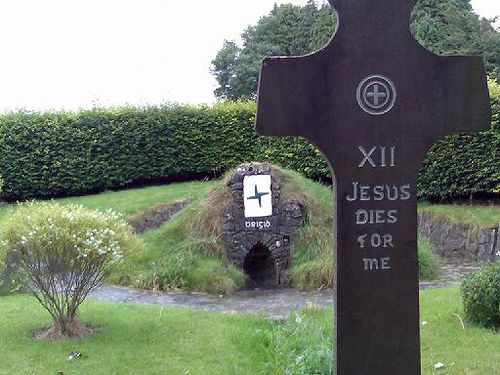 |
| Saint Brigid's Well |
Today, January 9, we celebrate the Feast of the Baptism of the Lord in the River Jordan by Saint John the Baptist—the first of the Luminous Mysteries of the Holy Rosary. At the end of the Christmas season, we, like Saint John the Baptist look forward to what was foretold in the Old Testament, the coming of Jesus, and His entering into public ministry.
Below, a hymn of praise “Concerning Our Lord and Saint John the Baptist,” written by Saint Ephraem.
Hymn XIV
Hymn Concerning Our Lord and Saint John
Response: Glory to Thee, my Lord, for Thee with joy Heaven and earth worship!
1. My thought bore me to Jordan, and I saw a marvel when there was revealed the glorious Bridegroom Who to the Bride shall bring freedom and holiness.
2. I saw John filled with wonder, and the multitudes standing about him, and the glorious Bridegroom bowed down to the son of the barren that he might baptize Him.
3. At the Word and the Voice my thought marvelled: for lo! John was the Voice; our Lord was manifested as the Word, that what was hidden should become revealed.
4. The Bride was espoused but knew not who was the Bridegroom on whom she gazed: the guests were assembled, the desert was filled, and our Lord was hidden among them.
5. Then the Bridegroom revealed Himself; and to John at the voice He drew near: and the Forerunner was moved and said of Him "This is the Bridegroom Whom I proclaimed."
6. He came to baptism Who baptizes all, and He showed Himself at Jordan. John saw Him and drew back, deprecating, and thus he spake:
7. "How, my Lord, willest Thou to be baptized, Thou Who in Thy baptism atonest all? Baptism looks unto Thee; shed Thou on it holiness and perfection?"
8. Our Lord said "I will it so; draw near, baptize Me that My Will may be done. Resist My Will thou canst not: I shall be baptized of thee, for thus I will it."
9. "I entreat, my Lord, that I be not compelled,-for this is hard that Thou hast said to me, 'I have need that thou shouldst baptize Me;' for it is Thou that with Thy hyssop purifiest all."
10. "I have asked it, and it pleases Me that thus it should be; and thou, John, why gainsayest thou? Suffer righteousness to be fulfilled, and come, baptize Me; why standest Thou?"
11. "How can one openly grasp in his hands the fire that burns? O Thou that art fire have mercy on me, and bid me not come near Thee, for it is hard for me!"
12. "I have revealed to Thee My Will; what questionest thou? Draw near, baptize Me, and thou shalt not be burned. The bridechamber is ready; keep Me not back from the wedding feast that has been made ready."
13. "The Watchers fear and dare not gaze on Thee lest they be blinded; and I, how, O my Lord, shall I baptize Thee? I am too weak to draw near; blame me not!"
14. "Thou fearest; therefore gainsay not-against My Will in what I desire: and Baptism has respect unto Me. Accomplish the work to which thou hast been called!"
15. "Lo! I proclaimed Thee at Jordan in the ears of the people that believed not and if they shall see Thee baptized of me, they will doubt that Thou art the Lord."
16. "Lo! I am to be baptized in their sight, and the Father Who sent Me bears witness of Me that I am His Son and in Me He is well pleased, to reconcile Adam who was under His wrath."
17. "It becomes, me. O my Lord, to know my nature that I am moulded out of the ground, and Thou the moulder Who formest all things: I, then, why should I baptize Thee in water?"
18. "It becomes thee to know wherefore I am come, and for what cause I have desired that thou shouldst baptize Me. It is the middle of the way wherein I have walked; withhold thou not Baptism."
19. "Small is the river whereto Thou art come, that Thou shouldst lodge therein and it should cleanse Thee. The heavens suffice not for Thy mightiness; how much less shall Baptism contain Thee!"
20. "The womb is smaller than Jordan; yet was I willing to lodge in the Virgin: and as I was born from woman, so too am I to be baptized in Jordan."
21. "Lo! the hosts are standing! the ranks of Watchers, lo! they worship And if I draw near, my Lord, to baptize Thee, I tremble for myself with quaking."
22. "The hosts and multitudes call thee happy, all of them, for that thou baptizest Me. For this I have chosen thee from the womb: fear thou not, for I have willed it
23. "I have prepared the way as I was sent:-I have betrothed the Bride as I was commanded. May Thy Epiphany be spread over the world now that Thou art come, and let me not baptize Thee!"
24. "This is My preparation, for so have I willed; I will go down and be baptized in Jordan, and make bright the armour for them that are baptized, that they may be white in Me and I not be conquered."
25. "Son of the Father, why should I baptize Thee? for lo! Thou art in Thy Father and Thy Father in Thee. Holiness unto the priests Thou givest; water that is common wherefore askest Thou?"
26. "The children of Adam look unto Me, that I should work for them the new birth. A way in the waters I will search out for them, and if I be not baptized this cannot be."
27. "Pontiffs of Thee are consecrated, priests by Thy hyssop are purified; the anointed and the kings Thou makest. Baptism, how shall it profit Thee?"
28. "The Bride thou betrothedst to Me awaits Me, that I should go down, be baptized, and sanctify her. Friend of the Bridegroom withhold Me not from the washing that awaits Me."
29. "I am not able, for I am weak, Thy blaze in my hands to grasp. Lo! Thy legions are as flame; bid one of the Watchers baptize Thee!"
30. "Not from the Watchers was My Body assumed, that I should summon a Watcher to baptize Me. The body of Adam, lo! I have put on, and thou, son of Adam, art to baptize Me."
31. "The waters saw Thee, and greatly feared ; the waters saw Thee, and lo! they tremble! The river foams in its terror; and I that am weak, how shall I baptize Thee?"
32. "The waters in My Baptism are sanctified, and fire and the Spirit from Me shall they receive; and if I be not baptized they are not made perfect to be fruitful of children that shall not die."
33. "Fire, if to Thy fire it draw near, shall be burnt up of it as stubble. The mountains of Sinai endured Thee not, and I that am weak, wherein shall I baptize Thee?"
34. "I am the flaming fire; yet for man's sake I became a babe in the virgin womb of the maiden. And now I am to be baptized in Jordan."
35. "It is very meet that Thou shouldst baptize me, for Thou hast holiness to purify all. In Thee it is that the defiled are made holy; but Thou that art holy, why art Thou to be baptized?"
36. "It is very right that thou shouldst baptize Me, as I bid, and shouldst not gainsay. Lo! I baptized thee within the womb; baptize thou me in Jordan!"
37. "I am a bondman and I am weak. Thou that freest all have mercy on me! Thy latchets to unloose I am not able; Thy exalted head who will make me worthy to touch?"
38. "Bondmen in My Baptism are set free; handwritings in My washing are blotted out; manumissions in the water are sealed; and if I be not baptized all these come to nought."
39. "A mantle of fire the air wears, and waits for Thee, above Jordan; and if Thou consentest to it and willest to be baptized, Thou shall baptize Thyself and fulfil all."
40. "This is meet, that thou shouldst baptize Me, that none may err and say concerning Me, 'Had He not been alien from the Father's house, why feared the Levite to baptize Him?' "
41. "The prayer, then, when Thou art baptized, how shall I complete over Jordan? When the Father and the Spirit are seen over Thee, Whom shall I call on, as priest?"
42. "The prayer in silence is to be completed: come, thy hand alone lay thou on Me. and the Father shall utter in the priest's stead that which is meet concerning His Son."
43. "They that are bidden, lo! all of them stand; the Bridegroom's guests, lo! they bear witness that day by day I said among them, 'I am the Voice and not the Word.' "
44. "Voice of him that cries in the wilderness, fulfil thou the work for which thou camest, that the desert whereunto thou wentest out may resound with the mighty peace thou preachedst therein."
45. "The shout of the Watchers has come to my ears; lo! I hear from the Father's house the hosts that sound forth the cry, 'In Thy Epiphany, O Bridegroom, the worlds have life.' "
46. "The time hastes on, and the marriage guests-look to Me to see what is doing. Come, baptize Me, that they may give praise to the Voice of the Father when it is heard!"
47. "I hearken, my Lord, according to Thy Word: come to Baptism as Thy love constrains Thee! The dust worships that whereunto he has attained, that on Him Who fashioned him he should lay his hand."
48. The heavenly ranks were silent as they stood, and the Bridegroom went down into Jordan; the Holy One was baptized and straightway went up, and His Light shone forth on the world.
49. The doors of the highest were opened above, and the voice of the Father was heard," This is my Beloved in Whom I am well pleased." All ye peoples, come and worship Him.
50. They that saw were amazed as they stood, at the Spirit Who came down and bare witness to Him. Praise to Thy Epiphany that gladdens all, Thou in Whose revelation the worlds are lightened!
Below, a hymn of praise “Concerning Our Lord and Saint John the Baptist,” written by Saint Ephraem.
Hymn XIV
Hymn Concerning Our Lord and Saint John
Response: Glory to Thee, my Lord, for Thee with joy Heaven and earth worship!
1. My thought bore me to Jordan, and I saw a marvel when there was revealed the glorious Bridegroom Who to the Bride shall bring freedom and holiness.
2. I saw John filled with wonder, and the multitudes standing about him, and the glorious Bridegroom bowed down to the son of the barren that he might baptize Him.
3. At the Word and the Voice my thought marvelled: for lo! John was the Voice; our Lord was manifested as the Word, that what was hidden should become revealed.
4. The Bride was espoused but knew not who was the Bridegroom on whom she gazed: the guests were assembled, the desert was filled, and our Lord was hidden among them.
5. Then the Bridegroom revealed Himself; and to John at the voice He drew near: and the Forerunner was moved and said of Him "This is the Bridegroom Whom I proclaimed."
6. He came to baptism Who baptizes all, and He showed Himself at Jordan. John saw Him and drew back, deprecating, and thus he spake:
7. "How, my Lord, willest Thou to be baptized, Thou Who in Thy baptism atonest all? Baptism looks unto Thee; shed Thou on it holiness and perfection?"
8. Our Lord said "I will it so; draw near, baptize Me that My Will may be done. Resist My Will thou canst not: I shall be baptized of thee, for thus I will it."
9. "I entreat, my Lord, that I be not compelled,-for this is hard that Thou hast said to me, 'I have need that thou shouldst baptize Me;' for it is Thou that with Thy hyssop purifiest all."
10. "I have asked it, and it pleases Me that thus it should be; and thou, John, why gainsayest thou? Suffer righteousness to be fulfilled, and come, baptize Me; why standest Thou?"
11. "How can one openly grasp in his hands the fire that burns? O Thou that art fire have mercy on me, and bid me not come near Thee, for it is hard for me!"
12. "I have revealed to Thee My Will; what questionest thou? Draw near, baptize Me, and thou shalt not be burned. The bridechamber is ready; keep Me not back from the wedding feast that has been made ready."
13. "The Watchers fear and dare not gaze on Thee lest they be blinded; and I, how, O my Lord, shall I baptize Thee? I am too weak to draw near; blame me not!"
14. "Thou fearest; therefore gainsay not-against My Will in what I desire: and Baptism has respect unto Me. Accomplish the work to which thou hast been called!"
15. "Lo! I proclaimed Thee at Jordan in the ears of the people that believed not and if they shall see Thee baptized of me, they will doubt that Thou art the Lord."
16. "Lo! I am to be baptized in their sight, and the Father Who sent Me bears witness of Me that I am His Son and in Me He is well pleased, to reconcile Adam who was under His wrath."
17. "It becomes, me. O my Lord, to know my nature that I am moulded out of the ground, and Thou the moulder Who formest all things: I, then, why should I baptize Thee in water?"
18. "It becomes thee to know wherefore I am come, and for what cause I have desired that thou shouldst baptize Me. It is the middle of the way wherein I have walked; withhold thou not Baptism."
19. "Small is the river whereto Thou art come, that Thou shouldst lodge therein and it should cleanse Thee. The heavens suffice not for Thy mightiness; how much less shall Baptism contain Thee!"
20. "The womb is smaller than Jordan; yet was I willing to lodge in the Virgin: and as I was born from woman, so too am I to be baptized in Jordan."
21. "Lo! the hosts are standing! the ranks of Watchers, lo! they worship And if I draw near, my Lord, to baptize Thee, I tremble for myself with quaking."
22. "The hosts and multitudes call thee happy, all of them, for that thou baptizest Me. For this I have chosen thee from the womb: fear thou not, for I have willed it
23. "I have prepared the way as I was sent:-I have betrothed the Bride as I was commanded. May Thy Epiphany be spread over the world now that Thou art come, and let me not baptize Thee!"
24. "This is My preparation, for so have I willed; I will go down and be baptized in Jordan, and make bright the armour for them that are baptized, that they may be white in Me and I not be conquered."
25. "Son of the Father, why should I baptize Thee? for lo! Thou art in Thy Father and Thy Father in Thee. Holiness unto the priests Thou givest; water that is common wherefore askest Thou?"
26. "The children of Adam look unto Me, that I should work for them the new birth. A way in the waters I will search out for them, and if I be not baptized this cannot be."
27. "Pontiffs of Thee are consecrated, priests by Thy hyssop are purified; the anointed and the kings Thou makest. Baptism, how shall it profit Thee?"
28. "The Bride thou betrothedst to Me awaits Me, that I should go down, be baptized, and sanctify her. Friend of the Bridegroom withhold Me not from the washing that awaits Me."
29. "I am not able, for I am weak, Thy blaze in my hands to grasp. Lo! Thy legions are as flame; bid one of the Watchers baptize Thee!"
30. "Not from the Watchers was My Body assumed, that I should summon a Watcher to baptize Me. The body of Adam, lo! I have put on, and thou, son of Adam, art to baptize Me."
31. "The waters saw Thee, and greatly feared ; the waters saw Thee, and lo! they tremble! The river foams in its terror; and I that am weak, how shall I baptize Thee?"
32. "The waters in My Baptism are sanctified, and fire and the Spirit from Me shall they receive; and if I be not baptized they are not made perfect to be fruitful of children that shall not die."
33. "Fire, if to Thy fire it draw near, shall be burnt up of it as stubble. The mountains of Sinai endured Thee not, and I that am weak, wherein shall I baptize Thee?"
34. "I am the flaming fire; yet for man's sake I became a babe in the virgin womb of the maiden. And now I am to be baptized in Jordan."
35. "It is very meet that Thou shouldst baptize me, for Thou hast holiness to purify all. In Thee it is that the defiled are made holy; but Thou that art holy, why art Thou to be baptized?"
36. "It is very right that thou shouldst baptize Me, as I bid, and shouldst not gainsay. Lo! I baptized thee within the womb; baptize thou me in Jordan!"
37. "I am a bondman and I am weak. Thou that freest all have mercy on me! Thy latchets to unloose I am not able; Thy exalted head who will make me worthy to touch?"
38. "Bondmen in My Baptism are set free; handwritings in My washing are blotted out; manumissions in the water are sealed; and if I be not baptized all these come to nought."
39. "A mantle of fire the air wears, and waits for Thee, above Jordan; and if Thou consentest to it and willest to be baptized, Thou shall baptize Thyself and fulfil all."
40. "This is meet, that thou shouldst baptize Me, that none may err and say concerning Me, 'Had He not been alien from the Father's house, why feared the Levite to baptize Him?' "
41. "The prayer, then, when Thou art baptized, how shall I complete over Jordan? When the Father and the Spirit are seen over Thee, Whom shall I call on, as priest?"
42. "The prayer in silence is to be completed: come, thy hand alone lay thou on Me. and the Father shall utter in the priest's stead that which is meet concerning His Son."
43. "They that are bidden, lo! all of them stand; the Bridegroom's guests, lo! they bear witness that day by day I said among them, 'I am the Voice and not the Word.' "
44. "Voice of him that cries in the wilderness, fulfil thou the work for which thou camest, that the desert whereunto thou wentest out may resound with the mighty peace thou preachedst therein."
45. "The shout of the Watchers has come to my ears; lo! I hear from the Father's house the hosts that sound forth the cry, 'In Thy Epiphany, O Bridegroom, the worlds have life.' "
46. "The time hastes on, and the marriage guests-look to Me to see what is doing. Come, baptize Me, that they may give praise to the Voice of the Father when it is heard!"
47. "I hearken, my Lord, according to Thy Word: come to Baptism as Thy love constrains Thee! The dust worships that whereunto he has attained, that on Him Who fashioned him he should lay his hand."
48. The heavenly ranks were silent as they stood, and the Bridegroom went down into Jordan; the Holy One was baptized and straightway went up, and His Light shone forth on the world.
49. The doors of the highest were opened above, and the voice of the Father was heard," This is my Beloved in Whom I am well pleased." All ye peoples, come and worship Him.
50. They that saw were amazed as they stood, at the Spirit Who came down and bare witness to Him. Praise to Thy Epiphany that gladdens all, Thou in Whose revelation the worlds are lightened!
Subscribe to:
Posts (Atom)






